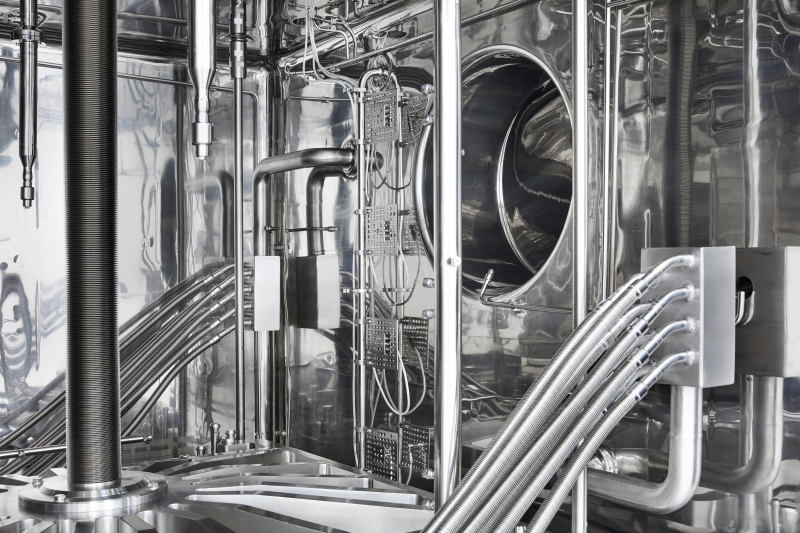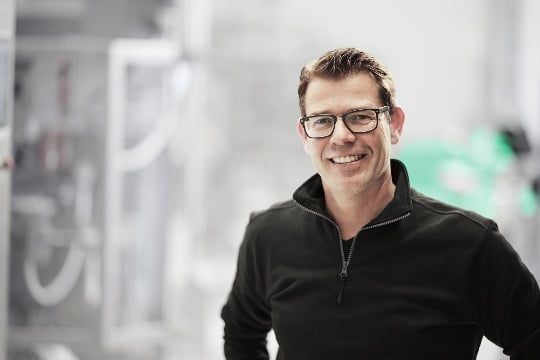
Blood plasma fractionation
Human blood plasma is being processed for a wide range of indications today thanks to pharmaceutical research and increasingly powerful fractionation technologies. The rise in global diseases, such as immunodeficiencies and genetic defects, is further fueling demand. Manufacturing companies must produce large quantities of high-quality and safe medicines to meet this global demand.
Facts
More than half of human blood consists of plasma. So-called plasma derivatives – drugs derived from human plasma – utilize the versatile properties of this carrier substance. Rich in proteins, antibodies, and clotting factors, plasma is the starting point for many therapies.
Notable proteins include albumin, immunoglobulins, and fibrinogens:
- Albumin
Supports the treatment of serious injuries - Immunoglobulins
Antibodies – are used to prevent or treat tetanus, rabies, or hepatitis - Fibrinogen-based products
Ensure that blood can coagulate again
Blood fractions

The extraction and processing of blood plasma derivatives

Pharmaceutical companies extract components from raw human plasma using centrifugation, depth filtration, and chromatographic methods. This rare and expensive resource requires efficient manufacturing processes to turn every drop of plasma into an effective and safe drug.
To this end, companies use elaborate processes ranging from thawing and filling to freeze-drying or pasteurization. Syntegon's highly flexible technologies cover key requirements along the entire value chain:

Our systems for thawing frozen blood plasma ensure gradual thawing of shear-sensitive products.

Based on decades of experience, Syntegon offers efficient systems for the synthesis and formulation of plasma derivatives, vaccines, and oncology products.

Syntegon inspection systems cover visual inspection and leak testing (CCIT) – from inline to end-of-line solutions.

Thanks to flow-optimized systems, our pasteurizers ensure consistently stable temperatures during final pasteurization of plasma derivatives.

Our flexible platforms ensure safe filling of sensitive proteins in the low, medium, and high output range.

Our freeze dryers ensure homogeneous temperatures, while the patented loading and unloading system enables precise processing and lyophilization.

Syntegon offers proven ultrafiltration, depth filtration, and chromatography systems to support the separation of blood plasma. We provide a comprehensive portfolio of viral inactivation and final purification options, including thermal inactivation and multi-stage enzyme purification.

Thawing and fractionation
The Syntegon subsidiary Pharmatec offers thawing and fractionation solutions for raw plasma that are tailored to meet customer-specific requirements. With decades of experience and high standards in design and implementation, the company ensures precise and efficient processes. These include special thawing systems with low shear agitators, centrifuges, and filtration systems. All our systems are designed for efficient processes and are easily accessible for maintenance and cleaning. Common CIP/SIP systems enable the economic use of resources and cleaning media through recirculation. Our pure media systems also offer the highest flexibility regarding sanitization methods. Moreover, Pharmatec can integrate both CIP/SIP and NaOH units for plasma production thanks to its extensive system expertise.

Purification and formulation
Pharmatec uses established equipment from its own portfolio along with high-performance units from partner companies to purify plasma fractions and other products. The company also offers a wide range of technologies for virus inactivation and final purification. The subsequent formulation prepares the sensitive fractions for further processing, where maintaining the quality of plasma derivatives is paramount. All solutions from Pharmatec are fully automated, allowing for continuous monitoring of all quality-critical parameters. Pharmatec process systems have either integrated or external CIP/SIP systems with PW, WFI, PS, which can be adapted to the specific application. Pharmaceutical companies receive comprehensive consulting services, which include laboratory testing of the required systems and processes. This also includes developing a tailor-made maintenance strategy.

Filling and closing
Syntegon’s innovative filling systems provide flexible filling operations in the low, medium, and high output ranges – in a compact design with integrated isolator. ALF lines accommodate different filling technologies on one platform: while the time-pressure filling system is suitable for high-volume filling, the peristaltic pump with up to 12 filling stations enables gentle and precise dosing of shear-sensitive products. Thanks to the optional twin fill process from the new “Max Pro” portfolio, the filling weight can be optimally determined and readjusted via main and secondary dosing with 100% in-process control at any time, ensuring maximum product yield. Optional secondary dosing, dose-in, and dose-out as well as empty runs on a scale contribute to a high yield and enable retroactive plunger insertion.

Freeze drying
Telstar's pharmaceutical freeze dryers offer unmatched quality with the perfect mix of standardization and customization. With multiple configurations available, there will be a solution that fits your needs. The Telstar brand has experience managing a wide range of container sizes and formats which guarantee the best production assurance. Our freeze dryers are ideal for small and large batch production: from 1 to 60 m2, under isolator or RABS, and connecting with filling lines with different loading and unloading solutions.
Benefits:
- Seamless integration with upstream and downstream equipment through harmonized interfaces, components, and documentation.
- One or two-story configurations.
- Cold shelf loading down to -45ºC without compromising loading speeds.
- Single side or passthrough loading and unloading available.
- Internal workshop to assure the best pressure vessel quality, including the shelf stack.

Inspection
High quality plasma derivatives with as few false rejects as possible require state-of-the-art inspection technologies. Syntegon offers a comprehensive range of in-line and end-of-line solutions for a wide variety of vial formats. Syntegon inspection systems provide reliable inspection of liquid and lyophilized products to detect leaks, particles, and cosmetic defects. Modern machines such as the AIM5 series combine visual inspection and leak detection (CCIT) on one platform. The Static Division (SD) technology accurately identifies foreign particles within products, while leak detection is performed via Headspace Analysis (HSA).

Pasteurization
Based on detailed simulations, the Syntegon subsidiary Schoeller-Bleckmann Medizintechnik (SBM) designs systems for pasteurizing blood plasma derivatives using different processes, such as steam/air mixture or hot water shower, to ensure the best process for each product. Thanks to precisely adjustable process parameters and a constantly stable temperature of 60 (+/- 0.5) degrees Celsius, the pasteurization process can safely handle sensitive plasma proteins such as albumin without denaturation. A flexible recipe editor allows for individualized processes – resulting in products that fully meet the applicable quality criteria.
Our solutions

Freeze dryer
Our freeze dryers ensure homogeneous temperatures, while the patented loading and unloading system enables precise processing and lyophilization.

Filling systems
Our flexible platforms ensure safe filling of sensitive proteins in the low, medium, and high output range.

RABS & Isolators
Our barrier systems include open RABS, closed RABS, isolators and containment systems.

Inspection
Syntegon inspection systems cover visual inspection and leak testing (CCIT) – from inline to end-of-line solutions.

Sterilizer/Pasteurizer
Thanks to flow-optimized systems, our pasteurizers ensure consistently stable temperatures during final pasteurization of plasma derivatives.







